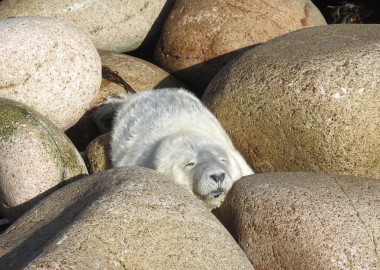The UK is home to globally important populations of both grey and common (harbour) seals.
A flourishing seal population is an indicator of a healthy marine ecosystem, which is crucial for our fishing industry to thrive and be successful. In fact, a healthy seal population is essential, as they perform the top predator function working in all weathers, all year round, to keep everything in balance. This creates marine environment resilience – something human activity tends to disrupt, but ironically depends upon. Like fishing profits, seal numbers are limited by fish availability – declining fish stocks result in declining seal populations as well as declining profits for the fishing industry. Seals are important messengers bringing stories about the state of seas to us on land, so we can take action to protect our seas before it is too late.
Grey seals are globally rare animals – our equivalent of an African elephant. If we want people to protect elephants for us to visit on safari, then we need to do the same for UK grey seals. Put another way, despite the UK having over a third of the world’s population of grey seals, there are still more red squirrels than grey seals in Britain.
Grey seals are at risk from cumulative threats including: climate change; toxic pollution, entanglement, plastics and other marine debris, as well as chronic disturbance at important pupping and resting sites. Seals face many growing threats but remain a wonderful natural attraction and so make their own valuable contribution to diversifying local coastal economies.
During the summer, heavily pregnant females need to rest on land and disturbing them can be fatal for their unborn pups. Mums without sufficient fat reserves can’t feed their pups enough in the autumn to ensure their pup’s survival through the winter. Grey pups can be separated from mum if people get too close. For seals up to 18 months old, death rates can be as high as 75% and disturbance makes this worse. This is not good for seals or industries that depend upon the sea.
The good news is, you can help protect your sustainable future, as disturbance is the easiest marine issue to solve. The Seal Alliance has produced nationally agreed, government backed signs and leaflets to raise public awareness about how to act responsibly around seals. The Cornwall Inshore Fishery and Conservation Authority have also created signs to help fishers know about the places where seals are well protected making it an offence to disturb them in three Sites of Special Scientific Interest (SSSIs) in Cornwall – Godrevy to St Agnes, Tintagel to Widemouth Bay SSSIs and the Aire Point to Carrick Du SSSI in West Penwith.
Many thanks for taking the time to read this and helping us to protect seals and our marine environment.
Sue Sayer
Seal Research Trust – Aka Cornwall Seal Group Research Trust (Charity number: 1162936)





